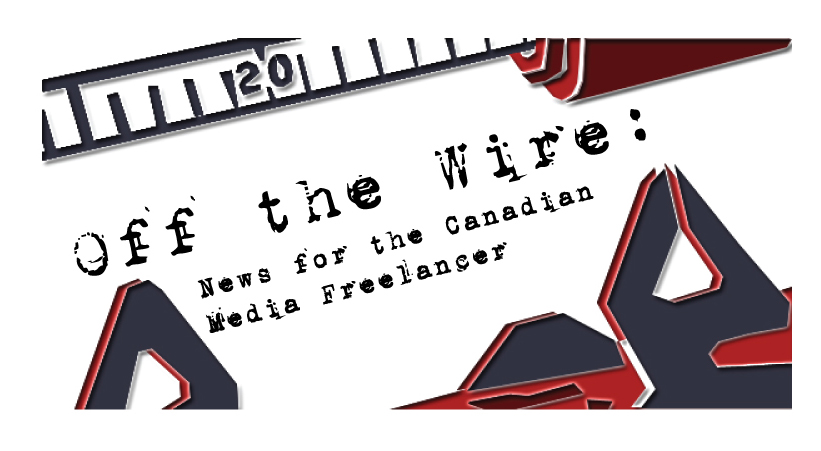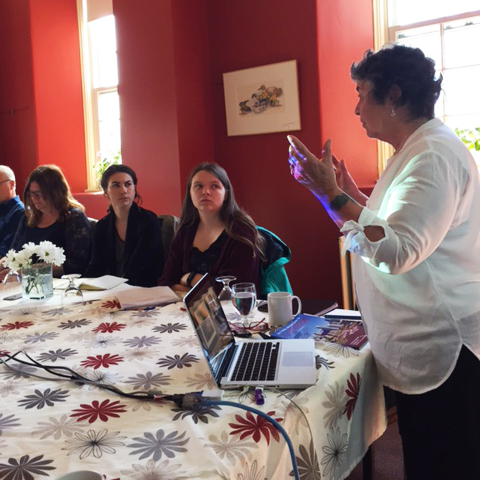Webinar: Tax Tips and Financial Planning for Freelancers
 When you work for yourself – like so many of us do these days – your business finances ARE your personal finances, and if you’re not careful, things can get very messy.
When you work for yourself – like so many of us do these days – your business finances ARE your personal finances, and if you’re not careful, things can get very messy.
Join us for a webinar called Tax Tips and Financial Planning for Freelancers on Monday, June 5 at 3:00 p.m. E.T. and start to learn how to run your sole-proprietorship finances.
It will cover questions such as: How do I know if something is a business expense or a personal expense? How much should I be saving for income taxes? What about GST or HST – what even is that? Should I be charging it? What about incorporation – should I be doing that? And will I ever get to go on vacation again? Entrepreneurship is the future, but the money stuff can be really confusing and, let’s be honest, really boring. Let us change that and get you organized so that you can work your finances like a boss.
The webinar will be led by Liz Schieck, a certified teacher and financial coach and who is passionate about financial literacy and planning. She loves helping clients wade through all the ugly-pretty financial stuff to make those big goals happen.
Register for the webinar at this link. CMG Freelance and CWA Canada Associate Members can use their membership numbers to register.
For a limited time, CMG Freelance is making live viewing of our webinars available to non-members. If you’d like to watch this one, you can use the special code “Storyboard” in place of a membership number.
Archived webinars are available for viewing by CMG Freelance and CWA Canada Associate Members on this members-only page on the CMG Freelance website. Subjects of previous webinars include contract negotiation, social media and cyber security for freelancers.
Students, volunteers and emerging media workers can sign up for a free CWA Associate Membership right here.
For information about the price and benefits of CMG Freelance membership check out the CMG Freelance website.
New webinar on extended health benefits plan for freelancers
Membership in CMG Freelance gives you access to a non-profit extended health care benefits package. And there’s a new webinar on the CMG Freelance website that explains the costs and benefits of the plan.
The Writers’ Coalition Program is an affordable health insurance program offered by the not-for-profit insurer AFBS. CMG Freelance members are guaranteed acceptance into the program, with no medical questionnaires necessary and no refusals based on pre-existing conditions.
There are two program options: Standard and Comprehensive. Both offer dental, prescription drug, extended health care, and travel emergency medical coverage. Both options also provide life and AD&D insurance and a Member and Family Assistance Program. There’s a monthly payment option available and premiums may be tax deductible.
The Writers’ Coalition’s website will give you a price quote in just two steps and it enables you to enrol in the program and pay online by credit card.
For more information about the plan, you can watch this webinar on the CMG Freelance website. Details about the insurance package are available on this page on the CMG Freelance site and on the Writers’ Coalition Program’s website.
Off The Wire: News for the Canadian media freelancer May 16-23
Once a week, we gather stories about the media business, journalism, writing, publishing, and freelancing—with a Canadian focus—and share them in Off the Wire. Who needs a water cooler?

From Canada:
- Kim Pittaway, Michael de Pencier and D.B. Scott to co-host 40th Anniversary National Magazine Awards [Magazine Awards]
- ‘Emerging Indigenous Voices’ award to counter ‘cultural appropriation’ prize [CBC]
- Freelance photojournalist charged with obstruction at scene of collision in Hamilton [J-Source]
- A Short History of the National Magazine Awards [Magazine Awards]
- Winnipeg Free Press staff agree to potential wage cuts to block job cuts [J-Source]
- Journalists and activism: Desmond Cole and the Star [J-Source]
From The U.S. and beyond:
- What to Do About Freelance Writing When You Update Your Resume [The Write Life]
- As bombs rain, freelancers build their own bunker [CJR]
- 6 Tips for Landing Repeat Writing Assignments [Mediabistro]
- New law protecting freelancers goes into effect in New York City [Crains New York]
- Study: Freelancers say they’re happier since going independent [Freelancers Union]
- Freelancing Just Got A Little Less Horrible [BuzzFeed]
- Forget Your Endless To-Do List: Try Time Blocking Instead [The Write Life]
Recently on Story Board:
- 2017 Portenier Human Rights Bursary competition open for applications: Applications opened this week for the 2017 Portenier Human Rights Bursary competition. The winner of the bursary receives $3000 to attend hostile environment training offered by approved course providers…
- Freelance Isn’t Free Act becomes law in New York City: Yesterday was a historic day for freelancers. The Freelance Isn’t Free Act, which was spearheaded by the Freelancers Union during a year-long campaign last year, became law in New York City…
Spot a story you think we should include in next week’s Off the Wire? Email the link to editor@thestoryboard.ca or tweet us at @storyboard_ca.
2017 Portenier Human Rights Bursary competition open for applications
Applications opened this week for the 2017 Portenier Human Rights Bursary competition. The winner of the bursary receives $3000 to attend hostile environment training offered by approved course providers.
The competition is open to freelance journalists and independent documentary filmmakers whose work focuses on human rights abuses. The bursary is offered by the Canadian Journalism Forum on Violence and Trauma, which also offers a number of training bursaries each year through the Forum Freelance Fund.
The application deadline is June 15th. Winners will be notified by July 31st. For more information on how to apply, see the Canadian Journalism Forum on Violence and Trauma website.
Freelance Isn’t Free Act becomes law in New York City
Yesterday was a historic day for freelancers. The Freelance Isn’t Free Act, which was spearheaded by the Freelancers Union during a year-long campaign last year, became law in New York City.
The #FreelanceIsntFree Act started with freelancers and the institution they built. That’s the power of a union.
— Sara Horowitz (@Sara_Horowitz) May 15, 2017
The law requires anyone hiring a freelancer for work worth $800 or more to use a written contract. The contract must describe the work being commissioned, the rate and payment method, the date when payment is due, and it must include contact information for both parties.
The law also requires contractors to pay their freelancers in full within 30 days of the work being completed or by the payment due date stated on the contract. Companies that do not pay on time could face penalties, including damages and attorney’s fees.
The Freelance Isn’t Free campaign was launched after the Freelancers Union released a report in 2015 that indicated that over 70 percent of freelancers have had trouble getting paid at some point in their careers.
The Freelancers Union also released an app yesterday that will help freelancers find legal support if they need to take action against non-paying clients.
The #FreelanceIsntFree Act marks the beginning of the real safety net for freelancers. pic.twitter.com/4JqEjdTFxV
— Freelancers Union (@freelancersu) May 15, 2017
Off The Wire: News for the Canadian media freelancer May 9-15
Once a week, we gather stories about the media business, journalism, writing, publishing, and freelancing—with a Canadian focus—and share them in Off the Wire. Who needs a water cooler?

From Canada:
- Jonathan Kay has resigned as EIC of The Walrus [Canadian Magazines]
- Canada’s National Newspaper Awards have a diversity problem [J-Source]
- High-profile Canadian journalists pledge to raise money for ‘appropriation prize’ [Toronto Star]
- Desmond Cole’s decision to leave the Toronto Star suggests a double standard on activism [J-Source]
- How striking Halifax journalists conjured an award-winning digital news outlet out of pluck and spite [Canadaland]
- A journalist’s guide to responsible social embeds and usage [J-Source]
- Globe and Mail Public Editor: Why are women absent from the pages of The Globe? [J-Source]
- Magazine winners announced in 2016 Atlantic Journalism Awards [Canadian Magazines]
From The U.S. and beyond:
- Take your skills to the next level with online learning [Freelancers Union]
- Advice from 18 news organizations to help you tailor your story pitches [Journalism.co.uk]
- Despite doing more with less, journalists at small newspapers are mostly optimistic [Poynter]
- Don’t Feel Guilty, Freelancers: 4 Reasons to Love Coffee Shops [The Write Life]
- So how in the world do you break into a career in podcasting, anyway? [Nieman Lab]
- 6 Millennials Share Why They Joined The Gig Economy And Ditched Their Day Jobs [Forbes]
- Writing Groups 101: How to Find Your Perfect Match [The Write Life]
- How to work in the gig economy and still save like a corporate lifer [Working Not Working]
- Negotiating 101 for Writers [Michelle Rafter]
- 5 Crucial Tips if You Want to Write for Local Publications [The Write Life]
Recently on Story Board:
- Know Your Worth, Know Your Rights: More often than not, writers are being asked to sign contracts these days, says Don Genova, president of CMG Freelance. Contracts can protect you, but they can also put an unfair burden on the writer…
- Expanding Your Portfolio with Sandra Phinney: With legacy media crumbling and a scarcity of full-time writing jobs, keeping a freelance lifestyle means looking in the nooks and crannies of your own backyard…
Spot a story you think we should include in next week’s Off the Wire? Email the link to editor@thestoryboard.ca or tweet us at @storyboard_ca.
Know Your Worth, Know Your Rights with Don Genova
by Grace Szucs
More often than not, writers are being asked to sign contracts these days, says Don Genova, president of CMG Freelance. Contracts can protect you, but they can also put an unfair burden on the writer.
Genova went over some freelance contract basics at an info session hosted by the Canadian Media Guild and CWA Canada in Halifax last week.
Take the time to look over these areas of a contract before you sign:
Moral rights and indemnification
Giving up moral rights means the publication can remove your name from the work, use it for advertising, break it up into pieces and use it in other articles, and they can change the article however they see fit.
Some contracts ask you to indemnify the publication in the event that they get sued. Check out this recent Story Board post by Lesley Evans Ogden about her experience with being asked to do so.
Genova notes that if you give up moral rights and you indemnify the publication, you could be responsible if the publication makes a change to your work that causes them to get sued.
Kill fees
Expanding Your Portfolio with Sandra Phinney
By Grace Szucs
With legacy media crumbling and a scarcity of full-time writing jobs, keeping a freelance lifestyle means looking in the nooks and crannies of your own backyard.
Sandra Phinney, freelance writer and photographer based in Yarmouth, Nova Scotia, is a travel writer at heart, but has had to get creative to survive.
“I do a lot of it, but I could never earn my living as a travel writer,” she said at an info session hosted by CMG Freelance and CWA Canada at the Dalhousie University Club in Halifax last week.
Diversify
In her past life as a farmer, Phinney learned that the more diversified her crops were, the more she was able to sell. The same applies to writing, she says.
In her early years, she teamed up with videographer, Don Parnell, to create a “one-stop-shop” called Parnell-Phinney Productions. Made up of a team of local on-call skilled media workers including voiceover artists, designers, photographers, translators, and an editor, the company was able to provide everything from newsletters to ad placements. They worked on:
Read the rest of this post »
Off The Wire: News for the Canadian media freelancer May 2-8
Once a week, we gather stories about the media business, journalism, writing, publishing, and freelancing—with a Canadian focus—and share them in Off the Wire. Who needs a water cooler?

From Canada:
- What impact will proposal to eliminate unpaid internships in federal industries have on media workers? [J-Source]
- Canada receives failing grades for protecting sources and newsrooms [J-Source]
- Vice Canada workers have a collective agreement [J-Source]
- Why journalists should study personal branding [J-Source]
- Vice Canada workers ratify collective agreement as digital journalists turn to unions [CBC]
- All Work No Pay: Why freelancing is more precarious than ever [Ryerson Review of Journalism]
- Canadian Media Guild members sign first collective agreement with VICE Canada [Canadian Magazines]
- CMG members at VICE Canada sign first collective agreement [CMG]
From The U.S. and beyond:
- 4 Easy-to-Avoid Freelancing Mistakes Every Rookie Makes [The Write Life]
- Five tech essentials for freelancers [Freelancers Union]
- This tool, made by college students, will save you all that time you spend transcribing [Poynter]
- America Needs Unions Now More Than Ever [Vice]
- How to be more productive when you work from home [Freelancers Union]
- 6 ways to solve creative differences with your client [Freelancers Union]
- How to Build a Strong Writing Portfolio When You’re a Ghostwriter [The Write Life]
- Facebook has found a head of news products to help fight its false news problem [Recode]
- Top 3 Habit Changes That Kickstarted My Freelance Career [Fast Company]
- Amid the wreckage of fallen startups, Longreads is increasing the original reporting it funds [Nieman Lab]
Recently on Story Board:
- Independent journalists are “far more vulnerable” to legal action: When Justin Brake followed Indigenous land protectors past a fence and into the Muskrat Falls hydro-electric dam site last October, he thought he could rely on the freedom of the press provision in the Charter of Rights and Freedoms…
- The Born Freelancer on Brief Encounters and Memorable Journeys: Talking to strangers on cross-country trains and planes really is anathema to many of you. My experiences generally have been the diametric opposite…
Spot a story you think we should include in next week’s Off the Wire? Email the link to editor@thestoryboard.ca or tweet us at @storyboard_ca.
Independent journalists and freelancers “far more vulnerable” to legal action
by Steve Cornwell
When Justin Brake followed Indigenous land protectors past a fence and into the Muskrat Falls hydro-electric dam site last October, he thought he could rely on the freedom of the press provision in the Charter of Rights and Freedoms.
Brake was reporting on demonstrators who went several kilometres into the site and occupied space in a Muskrat Falls workers’ camp. The land protectors were protesting the potential impacts the construction of the dam would have on their fishing and food supplies.
Now, just over six months removed from covering the story for The Independent, an online news site in Newfoundland and Labrador, Brake is facing three charges – one civil and two criminal – the latter of which could result in up to 10 years in jail.
“I wasn’t really tuned into press freedom issues,” says Brake. “It was just something I took for granted because I knew it was constitutionally protected; that’s basically why I made the decision I did that day because I thought I would have protection because the constitution is the highest law in Canada.”
Facing similar charges as the land protectors he was covering, Brake warns that Canadian journalists “shouldn’t feel that they have that protection guaranteed, it’s not guaranteed.”
Tom Henheffer, executive director of Canadian Journalists for Free Expression says that independent journalists and reporters from smaller media outlets are “far more vulnerable and far more often targeted” for legal action than those working for larger media outlets.
Read the rest of this post »






